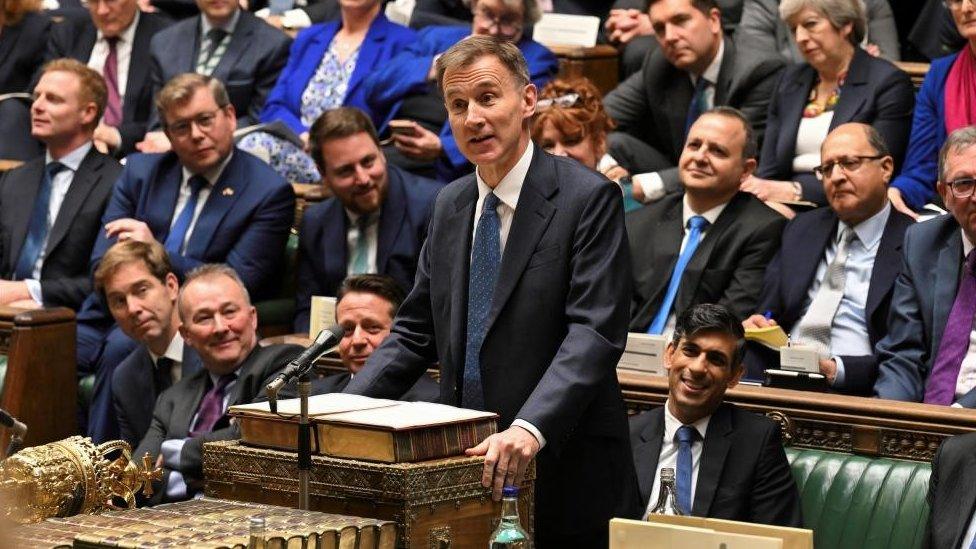Autumn Statement: Hunt denies tax cuts were pre-election giveaway
- Published
- comments

Chancellor Jeremy Hunt has insisted he did not make "crowd-pleasing" tax cuts as giveaways ahead of the next general election in his Autumn Statement.
Mr Hunt used Wednesday's statement to announce a £10bn National Insurance cut for millions and an uplift in benefits.
The Conservatives claimed they had delivered the biggest tax cuts in decades in a move to boost the UK's stagnant economy and top up incomes.
But the UK's overall tax burden is still on course to hit a record high.
The percentage of the nation's income being paid in tax is set to rise to its highest level in 80 years, according the Office for Budget Responsibility (OBR).
Speaking to the BBC, Mr Hunt denied the Conservatives were being "dishonest" about the UK's tax burden.
Mt Hunt said "contrary to speculation" about a spring general election, "we didn't choose the crowd-pleasers, the inheritance tax or income tax cut".
The chancellor argued he instead chose "tax cuts that are going to help businesses" and stimulate economic growth.

More on the Autumn Statement

The promise to cut National Insurance for millions at the beginning of January, rather than by April as is standard after an Autumn Statement, has fuelled speculation of a potential May election.
The next general election must be held before the end of January 2025, but the prime minister can call it earlier.
Conservative MPs were generally pleased with the Autumn Statement but privately few think it will be enough to narrow the gap with Labour.
"It's good to finally see tax cuts. I think Jeremy has handled the last year really well. But it's not going to be enough to shift the dial," one minister said.
Another Conservative MP said: "I think the chancellor made the right decisions with the money he had available. But there's going to have to be a lot more tax cuts in the budget for us to go into the election with."
For weeks before the Autumn Statement, Mr Hunt had repeatedly insisted that tax cuts were "virtually impossible" given the dire state of the nation's finances.
But in his statement, Mr Hunt said he had decided to cut some taxes because inflation - the rate at which prices go up - had eased and forecasts showed reduced borrowing.
In a decision affecting 27 million people, the chancellor said he would cut the main rate of National Insurance from 12% to 10% from 6 January.
The chancellor said the reduction "means someone on the average salary of £35,000 will save over £450 a year".
Labour has backed the chancellor's National Insurance reduction, but say workers will be paying more tax at the next election than the last.
Labour's shadow chancellor Rachel Reeves she was "under no illusions about the scale of the challenge" facing her if Labour won the next general election.
She said a Labour government would have made different choices in the Autumn Statement, including putting more money into the NHS by abolishing the non-dom tax status, and reforming to the planning system.
Ms Reeves said the Autumn Statement did not "remotely compensate for the tax increases" already announced by the government.
Mr Hunt's decision last year to freeze the level of income at which workers start paying National Insurance means millions will be dragged into paying higher rates or be forced to pay the tax for the first time.
The Autumn Statement's £20bn of tax cuts compare to about £90bn being raked in by tax changes announced last year, according to the Resolution Foundation think tank.
The think tank says tax as a share of GDP is forecast to rise by 4.5 percentage points between 2019-20 and 2028-29 - the highest level in 80 years.
Richard Hughes, the chairman of the OBR, said the chancellor was able to cut certain taxes because he had not changed spending plans for public services.
Mr Hunt said "of course" taxes were going up to pay down debt built up during the pandemic and following the spike in energy prices driven by the war in Ukraine.
"But yesterday I did make a start in bringing down the tax burden," Mr Hunt said. "I've never said that we were going to get there all in one go."
Other Autumn Statement announcements included:
Confirmed the "full expensing" tax break - allowing companies to deduct spending on new machinery and equipment from profits - would be made permanent
Set out stricter welfare rules for unemployed people and those with disabilities who are judged to be not doing enough to find work
Increased the minimum wage by more than a pound to £11.44 per hour from April next year
Froze alcohol duty until August next year, with no increase in duty on beer, cider, wine or spirits
Increased tobacco duty by 2% above inflation, with the duty on hand-rolling tobacco to rise an additional 10% above inflation
In its economic analysis of the chancellor's plans, the OBR slashed the UK's growth forecasts for the next two years, to 0.7% in 2024 and 1.4% in 2025.
The financial watchdog also said living standards would not return to pre-pandemic levels until 2027/28.
The reason for this, the OBR said, is that inflation is expected to "remain higher for longer", returning to its 2% target in 2025, a year later than forecast in March.